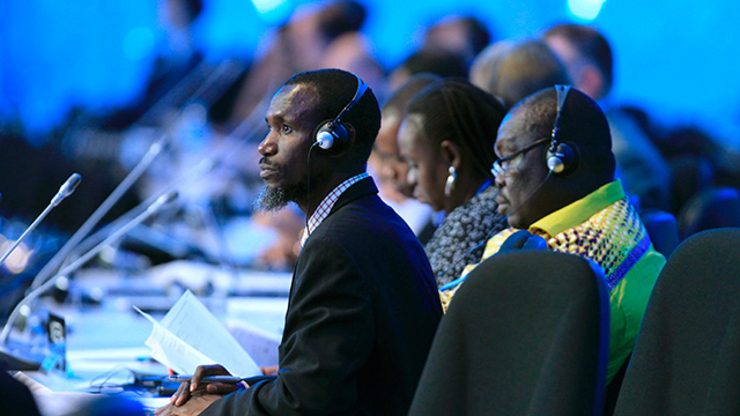SUMMARY
This is AI generated summarization, which may have errors. For context, always refer to the full article.

LIMA, Peru – Negotiators scrambled on the final day of UN talks Friday, December 12 to break a deadlock between rich and developing countries on forging the elements of a world pact to curb climate change.
A years-old dispute over sharing responsibility for tackling the climate problem drove the 12-day haggle towards extra time, darkening prospects for the most ambitious environmental accord ever.
As countries butted heads over key components of the deal, conference host Peru had on Thursday, December 11 instructed negotiators to craft a draft text with different options on 4 sticking points.
That document was released late at night, followed by frantic against-the-clock bargaining to whittle it down to a consensus text.
Two hours before the scheduled closure, Peruvian Environment Minister Manuel Pulgar-Vidal agreed to give negotiators more time.
“We are almost there. We need to make just a final effort,” he said. “We need to take political decisions.”
Campaigners in Lima said they feared a weak-willed compromise.
“The latest text which countries are working on has been stripped down to its bare bones to accommodate the whims of the lowest common denominator,” said Christian Aid’s Mohamed Adow.
“Right now we are facing the prospect of being no further forward than we were when we left last year’s meeting in Warsaw.”
Green group WWF, also observing the annual negotiations round, said the new draft “contains a mixed bag of options.”
“It’s crunch time for negotiators here in Lima and everything is still up in the air,” WWF said.
Countries disagree on how “differentiation” will be applied in a process next year of declaring national pledges for curbing Earth-warming greenhouse gas emissions. (READ: Climate pledges exceed $10B at Lima talks)
Developing nations insist the West must bear a bigger burden for the carbon cuts, having started decades earlier to pollute their way to prosperity.
But rich countries point the finger at developing giants like China and India furiously burning coal to power their rapid growth.
Developing nations further demand that pledges incorporate not only action on reducing carbon emissions, but also financial help and adaptation aid to shore up their climate defenses. (READ: Developing world may need annual $500B for climate by 2050 – UN)
A format for the pledges must be agreed in the Peruvian capital to allow countries to start their submissions from the first quarter of next year.
They will be at the core of a global climate pact that nations have agreed to sign in Paris in December 2015, to enter into effect by 2020, seeking to limit average global warming to two degrees Celsius (3.6 degrees Fahrenheit) over pre-Industrial Revolution levels.
‘Weak to barely acceptable’
“Some key elements fell to the cutting room floor and are not in the text at all,” Union of Concerned Scientists analyst Alden Meyer said of the latest draft.
Dropped text included language on absolute, economy-wide mitigation targets for developed countries.
The current range of options on key points “go from weak or minimal, to barely acceptable, to OK,” said Meyer.
And he predicted differentiation would remain a tough issue Friday, having been “pretty much scrubbed out of most of the text.”
“That may not be acceptable to some” developing countries.
Another major blocking point is whether or not to have a process to assess the pledges’ global impact on the 2 C goal – with China a key opponent.
The leader of the Catholic world also weighed in on the debate, saying in a letter to Pulgar-Vidal that “time to find global solutions is running out.”
“We can only find adequate solutions if we act together,” Pope Francis said in the message, issued on Thursday.
There was a “moral imperative to act,” he said. Climate change “affects all of humanity, in particular the poorest, and future generations.”
Scientists say 2 C warming is relatively safe but still no guarantee against damage to the climate system.
On current carbon trends, the planet is on course for around 4 C of warming this century, dooming future generations to a planet of worsening drought, flood, storm and rising seas, they say. – with Richard Ingham, Agence France-Presse/Rappler.com
Add a comment
How does this make you feel?
There are no comments yet. Add your comment to start the conversation.